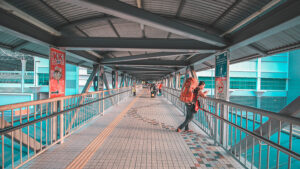
Vangabonding isn’t exactly a new idea, as the author of The 4-Hour Workweek Tim Ferriss will openly admit. While there are new terms to describe the phenomenon, like “lifestyle design,” the idea of becoming an explorer and living a location-independent lifestyle is appealing to many.
As I’ve discovered, though, living as a digital nomad isn’t always a bed of roses. Your journeys will test you, and you will need to learn new skills for survival. Here are several skills you’ll gain by living nomadically.
Time Management
If you think you were good at time management before, as a digital nomad, you’ll need to become even better at it. From cross-country drives to long flights to new continents, travel is going to become a regular part of your routine, and you will need to make the most of it.
Most lifestyle designers have businesses or freelancing contracts they need to manage ongoingly. Some only need to tend to their operations for 20 to 30 hours per week, while many others work full-time or longer.
So, you will need to factor work into your journeys. But you should be thinking more granularly too – sightseeing, lunches, calls back to home, and more. Efficiency is key because your psychic energy will often be used up in travel.
Packing
And when I say “packing,” I really mean what to bring, what to leave behind, what to acquire along the way, and so on.
(Although guaranteed you will become much faster at packing too.)
It’s a little easier to plan for land-based travel, given that you can store bags in your trunk or in the back of your car. But here are a few things I’ve figured out along the way:
- Clothing. Too much clothing can become a burden. But you need clothing for warmer and colder climates (or seasons as the case might be). Ideally, you want lightweight clothing that folds into small squares and is washable in a sink.
- Laundry. There are coin laundry services in most cities. But you don’t want to travel with big, heavy jugs of laundry detergent or have to purchase detergent every time you go to do your laundry. Laundry strips are compact, easy to carry, and safe with most if not all machines.
- Electronics. It’s good to have backups for everything – USB cables for your smartphone, replacement tips for your Apple Pencil, power cords for your laptop, and so on. You never know when you might need them.
Problem-Solving
Problem-solving is a bit of a lost art but guaranteed it will benefit lifestyle designers just as it does entrepreneurs.
The unexpected can happen on your travels. For instance, at one point, I had my bank card frozen due to malicious-looking activity. Even after getting the card replaced, I found myself unable to make online purchases (it was my primary means of booking Airbnb stays). So, I had to stay at a hotel (where I could make a payment in person) as I sorted out the glitches with my bank.
At times, you may need to stay in hostels, crash on a couch, sleep in the basement of a church, or even camp! Be ready to think outside the box.
Final Thoughts
You will be amazed by what you learn as a digital nomad, whether it’s basic survival skills, how to save money on flights, learning new languages, or otherwise. Be prepared to stretch yourself. You’re not doing it right if you aren’t being stretched!
